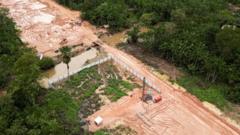The Brazilian state government has initiated a controversial four-lane highway project that traverses vast areas of protected Amazon rainforest in preparation for the upcoming COP30 climate summit, scheduled for November in Belém. While this road is intended to accommodate over 50,000 attendees, including global leaders, it has raised alarm among environmentalists and local communities who see the deforestation as contradictory to the summit’s aims of promoting climate action.
Extensive logging has already disrupted significant portions of the verdant landscape, with cleared land spanning more than 13 kilometers (8 miles) into the heart of the forest. Locals, like resident Claudio Verequete, have seen their livelihoods vanish as their açaí berry harvests are destroyed with no compensation in sight. With fears of further impending development now that the area is accessible, community members express concern about the risk of losing their homes and resources to commercial interests.
The road not only displaces local economies but also fragments vital ecosystems, endangering wildlife populations. Professor Silvia Sardinha, a wildlife expert, warns that the highway disrupts animal movements and compromises rehabilitation efforts for injured wildlife, exacerbating the decline of biodiversity in the region.
While Brazilian officials champion the summit's potential to highlight the Amazon's plight and promote sustainability, critics argue that the actual voices of Amazonian inhabitants are being overlooked amidst governmental discussions. Previous plans for the highway had been shelved due to environmental considerations, but renewed infrastructure initiatives are being fast-tracked in light of the summit.
Infrastructure Secretary Adler Silveira has described the project, dubbed Avenida Liberdade, as a necessary "sustainable highway" that will feature wildlife crossings, bike lanes, and upgraded facilities within the city’s infrastructure. Furthermore, major investments are being made to expand the local airport and develop public parks.
Some local business owners believe these projects will revitalize Belém and offer new opportunities in a place they feel has long been neglected. However, there remains growing apprehension about whether the environmental costs of such developments will truly align with the summit's goal of fostering a sustainable future.
As global leaders prepare to congregate for COP30, critics continue to question the ethical implications of transporting thousands of attendees across the globe, arguing it may dilute the overall environmental message of the conference.
Extensive logging has already disrupted significant portions of the verdant landscape, with cleared land spanning more than 13 kilometers (8 miles) into the heart of the forest. Locals, like resident Claudio Verequete, have seen their livelihoods vanish as their açaí berry harvests are destroyed with no compensation in sight. With fears of further impending development now that the area is accessible, community members express concern about the risk of losing their homes and resources to commercial interests.
The road not only displaces local economies but also fragments vital ecosystems, endangering wildlife populations. Professor Silvia Sardinha, a wildlife expert, warns that the highway disrupts animal movements and compromises rehabilitation efforts for injured wildlife, exacerbating the decline of biodiversity in the region.
While Brazilian officials champion the summit's potential to highlight the Amazon's plight and promote sustainability, critics argue that the actual voices of Amazonian inhabitants are being overlooked amidst governmental discussions. Previous plans for the highway had been shelved due to environmental considerations, but renewed infrastructure initiatives are being fast-tracked in light of the summit.
Infrastructure Secretary Adler Silveira has described the project, dubbed Avenida Liberdade, as a necessary "sustainable highway" that will feature wildlife crossings, bike lanes, and upgraded facilities within the city’s infrastructure. Furthermore, major investments are being made to expand the local airport and develop public parks.
Some local business owners believe these projects will revitalize Belém and offer new opportunities in a place they feel has long been neglected. However, there remains growing apprehension about whether the environmental costs of such developments will truly align with the summit's goal of fostering a sustainable future.
As global leaders prepare to congregate for COP30, critics continue to question the ethical implications of transporting thousands of attendees across the globe, arguing it may dilute the overall environmental message of the conference.

















